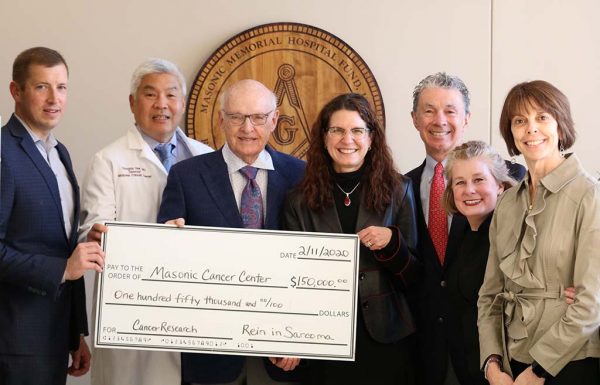
Rein in Sarcoma proudly announces a $150,000 research grant approved by the Rein in Sarcoma Board on January 27, 2020. This brings the cumulative research funding by Rein in Sarcoma to $2 million since the organization’s founding in 2001. This grant will fund the following three exciting University of Minnesota Masonic Cancer Center projects:
“eBAT as a Modulator of the Myeloid Immune Checkpoint in Cancer.” | $50,000

Principle Investigator: Jaime Modiano, VMD, PhD
Co-Investigator: Jong Kim, VMD, PhD
Summary: eBAT (EGF bispecific angiotoxin) is a drug with excellent safety profile that has shown efficacy against sarcomas in vitro, in small laboratory animal models, and in dogs with spontaneous vascular sarcomas. Our goal is to determine eBAT’s mechanisms of action to rationally expand its use to treat human sarcomas where it will provide comparable benefits and address a critical unmet need. The hypothesis is that eBAT eliminates immunosuppressive myeloid cells in the tumor environment, promoting enhanced anti-tumor immunity. We will test the hypothesis through one aim, to determine the effect of immunosuppressive myeloid cell depletion or persistence in the therapeutic efficacy of eBAT against sarcomas. The experimental model will consist of syngeneic mouse fibrosarcoma, where we have deleted the urokinase receptor (uPAR) using genome editing, uPAR-knockout mice, and a novel methodology to generate bone marrow chimeras in newborn mice which will promote full donor chimerism of myeloid cells, lymphoid cells and tissue macrophages. eBAT, and its mouse specific homolog, meBAT, will be tested in this model to examine their ability to induce tumor responses and immune infiltration in animals with wild type and uPAR-deficient tumors implanted in wild type mice and in chimeric mice with uPAR-knockout myeloid cells and macrophages. We predict that eBAT will have modest effects to reduce tumor growth in this model, due the low affinity binding to mouse UPAR. On the other hand, we expect meBAT will reduce growth of uPAR+ tumors in all recipients, but will only reduce growth of uPAR-KO tumors in mice with uPAR+ bone marrow. We anticipate tumor reduction will be associated with fewer myeloid-derived suppressor cells and macrophages in the tumors, as well as increased numbers of infiltrating T cells and NK cells. This experiment will allow us to define appropriate conditions for subsequent experiments to study the immune response in greater depth and to test the effect of eBAT in combination with drugs that block the PD-1/PD-L1 T-cell exhaustion checkpoint.
“Using Propranolol to Generate an Anti-Tumor Microenvironment.” | $50,000

Principle Investigator: Erin Dickerson, PhD
Co-Investigator: Kaylee Schwertfeger, PhD
Summary: Macrophages can be programmed within the tumor microenvironment toward anti-tumor or pro-tumor responses. Tumor cells can promote the pro-tumor functions of macrophages by scavenging cholesterol from the membranes of macrophages. In contrast, cholesterol accumulation in macrophages promotes an anti-tumor phenotype. We recently found that propranolol, a drug commonly used to treat heart disease, disrupts the ability of tumor cells to scavenge extracellular substrates such as cholesterol. Based these findings and our preliminary data, we propose that propranolol inhibits tumor cells from scavenging cholesterol from tumor associated macrophages, programming macrophages toward an anti-tumor phenotype and harnessing their ability to promote adaptive, anti-tumor immune responses. Studies are proposed to determine if propranolol prevents sarcoma cells from scavenging cholesterol from macrophages, and whether propranolol promotes a shift toward an anti-tumor microenvironment. Using a combination of in vitroand in vivoapproaches, these studies will provide novel information regarding the ability of propranolol to remodel the tumor microenvironment, resulting in decreased immune suppression and enhanced anti-tumor responses. Successful completion of the proposed work investigating the positive impact of propranolol on reprogramming of the tumor microenvironment will accelerate our progress in the identification of synergistic drug combinations and the inclusion of tumor immunotherapies.
“Computationally Deciphering the Paths of Genomic Catastrophe in Osteosarcoma.”| $50,000

Principle Investigator: Ruping Sun, PhD
Co-Investigator: Lauren Mills, PhD
Summary: Osteosarcoma is characterized by massive genomic catastrophes. Timing and relative ordering between the genomic catastrophic constraints should allow both earlier diagnosis and better prediction of tumor progression. However, such evolutionary trajectories remain elusive due to the lack of advanced computational methods that robustly deduce the paths of somatic changes from next-generation sequencing (NGS) data. Drawing on the full spectrum of somatic alterations detectable from NGS data, we seek to fill a lacuna in knowledge on cancer evolution through innovating reconstructive computational algorithms to decipher the time ordering of genomic catastrophe in osteosarcoma. Our algorithms will enable the inference of the relative ordering of loss of heterozygosity, whole genome doublings, structural changes and other localized catastrophes in osteosarcoma using public NGS data. Backtracking the chaos to discover the initiating genomic event may reveal novel drivers of this devastating disease and strategies to therapeutically intervene. The mode of evolutionary trajectories of catastrophes is a key genomic feature allowing better patient stratification in terms of tumor evolvability. The computational framework established here, whereas inspired by the complexity of the OS genome, will have an immeasurable impact on tracking the dynamics of other sarcoma subtypes showing genome instability, particularly given the urgent need to account for copy number alterations in studies of tumor evolution.

